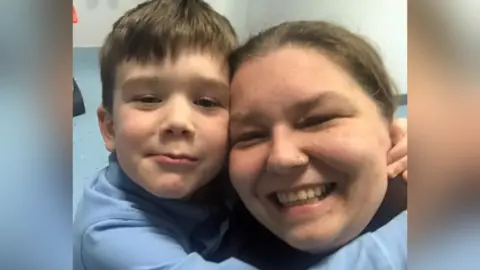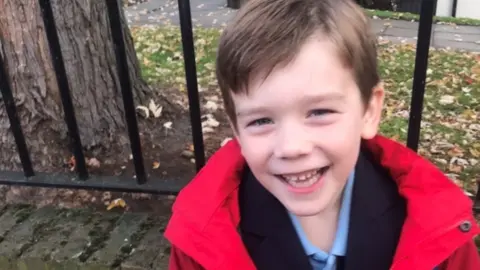Mum urges vaccine push and shares how son died after catching measles
 PA Media
PA MediaA mother whose child died aged six from a brain inflammation caused by measles hopes sharing her story will encourage parents to "vaccinate more".
It comes as the UK Health Security Agency (UKHSA) warned of measles outbreaks in parts of London.
Gemma Larkman-Jones wants more parents to consider having their children vaccinated sooner.
Her son, Samuel, developed a rare form of brain inflammation after catching measles, and died in 2019.
"I honestly think that if people knew that this was a possibility they would vaccinate more," Ms Larkman-Jones, 45, of Brixton, south London, told the PA Media news agency.
"Even if it just makes one parent question how many lives could that one child being vaccinated save?
"I don't want any other parent to go through this."
Prof Dame Jenny Harries, UKHSA chief executive, warned that measles is spreading among unvaccinated communities, and added that a "national call to action" is needed across the country.
Vaccination rates across the UK have been dropping, but there are particular concerns in parts of the capital as well as in some areas of the West Midlands.
Ms Larkman-Jones believes Samuel's death was avoidable had he been vaccinated with the measles, mumps and rubella (MMR) jab, but she said he had been put on a delayed vaccination programme.
 PA Media
PA MediaIn February 2019 Samuel was transferred to St Thomas' Hospital where a lumbar puncture and an MRI test found he had the neurological disorder subacute sclerosing panencephalitis (SSPE).
Ms Larkman-Jones said weeks later Samuel fell into a "vegetative state" and died on 30 April.
"Samuel didn't need to die and that's the guilt I carry every day with me," she said.
"People just think it's a bit of a temperature, but I think they've forgotten that people can go blind, people can go deaf, people who seemingly sailed through measles can end up years down the line with SSPE," she said.
"I honestly do believe that people just think that measles, like chickenpox, is part of being a child and it's so not.
"I think (my story) will make people think 'although it's a risk, it's still a risk, am I going to risk my child dying for something that he doesn't need to?'"

Listen to the best of BBC Radio London on Sounds and follow BBC London on Facebook, X and Instagram. Send your story ideas to [email protected]
